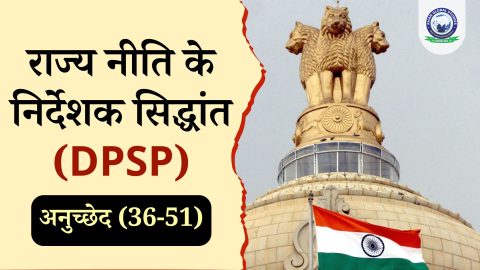The Directive Principles of State Policy (DPSP) in the Indian Constitution are mentioned in Part IV of the Constitution. These principles guide the governments of the country towards social, economic and political justice in India. Like fundamental rights, these principles are also designed to protect the interests of Indian citizens, but they cannot be directly enforced through the courts. Nevertheless, the Directive Principles of State Policy provide the necessary guidance to realize the concept of a welfare state.
What are the Directive Principles of State Policy (DPSP)?
The Directive Principles of State Policy are the guiding principles in the Constitution that the central and state governments must keep in mind while formulating policies and laws. These principles guide the government towards achieving the goals of social and economic justice of the Indian Constitution.
This provision contained in Part IV of the Constitution reflects the vision of the members of the Constituent Assembly, who were committed to eliminating social and economic inequalities in the country. These principles pave the way for the establishment of an egalitarian society and strive to realise the ideals of justice, liberty, equality and fraternity enshrined in the Preamble of the Constitution.
Classification of Directive Principles of State Policy
The Directive Principles of State Policy are divided into three major categories based on their objectives and sources of origin:
1. Socialist Principles
These principles emphasise establishing a socio-economic structure that ensures social and economic justice. According to these principles, the State has to perform the following functions:
- Article 38: The State shall promote social, economic and political justice and minimise inequalities.
- Article 39: The State shall ensure that all citizens have adequate means of livelihood and that there is no unequal distribution of wealth among any individual or group.
- Article 39A: To provide equal justice and free legal aid to the poor.
- Article 41: This provision directs the State to provide relief to citizens in cases of unemployment, old age, sickness and disablement.
- Article 42: To ensure just and humane conditions of work and to provide maternity benefits.
- Article 43: The State shall endeavour to secure a living wage and a decent standard of living for all workers.
- Article 43A: To take steps to ensure the participation of workers in the management of industries.
- Article 47: To raise the level of nutrition and the standard of living of the people and to improve public health.
2. Gandhian Principles
Inspired by the ideas and ideals of Mahatma Gandhi, these principles focus on promoting rural development, cooperation, self-governance and social justice. These principles include:
- Article 40: The State shall establish village panchayats to promote self-governance in rural areas.
- Article 43: Promoting cottage industries on an individual or co-operative basis in rural areas.
- Article 43B: There is a need to promote the voluntary formation, autonomous operation and democratic control of cooperative societies.
- Article 46: The State shall promote the educational and economic interests of the weaker sections, particularly the Scheduled Castes and the Scheduled Tribes.
- Article 47: Prohibition of consumption of intoxicants and alcohol which are injurious to health.
- Article 48: Prohibition of slaughter of cows, calves and other milk-giving and agricultural animals and improvement of their breeds.
3. Liberal-Intellectual Principles
These principles focus on the protection of individual liberty and civil rights and promote progressive reforms in society. These include:
- Article 44: The State shall strive to secure a uniform civil code for all citizens of the country.
- Article 45: The State shall ensure that early childhood care and education are available to all children.
- Article 48A: The State shall protect the environment and take steps to conserve natural resources.
- Article 49: To protect historical and cultural heritage, monuments and objects declared of national importance.
- Article 50: To separate the judiciary from the executive in the public services of the State.
- Article 51:
- To promote international peace and security and to maintain honourable and just relations between nations.
- To promote respect for international law and treaties.
- To encourage the settlement of international disputes through arbitration.
Relationship between DPSP and Fundamental Rights
Although Fundamental Rights and Directive Principles of State Policy are included in different parts of the Constitution, both aim at the well-being of the citizens. The courts can enforce fundamental rights, while there is no legal obligation to enforce the Directive Principles of State Policy.
However, on many occasions, the courts have given judgments in some cases keeping in mind the Directive Principles of State Policy. This in a way shows how important the role of these principles is in policy making and governance.
Some new provisions were added to these principles by the 42nd Constitutional Amendment, including Article 39A which talks about free legal aid to the poor and Article 48A which talks about protection and improvement of the environment.
Features of Directive Principles of State Policy
Following are some of the major features of the Directive Principles of State Policy:
- Non-Justiciable: These principles are not legally enforceable. They cannot be enforced by the courts.
- Establishment of a Welfare State: The main objective of these principles is to make India a welfare state.
- Socio-Economic Democracy: These principles help in establishing socio-economic democracy.
- Aid to the Judiciary: These principles help the courts in constitutional interpretations, especially when a law seeks to ensure social justice.
Utility of Directive Principles of State Policy
Although these cannot be enforced through the courts, their utility is immense. They play an important role in providing stability in policy-making and giving direction to government actions. These principles act as a yardstick against which the performance of governments can be evaluated.
Under these principles, the state should play an active role in the direction of social and economic development, so that an egalitarian society can be established. These principles are essential for fulfilling socio-economic rights and are required to be made a part of any state policy.
Conclusion
The Directive Principles of State Policy are the legacy of the Indian Constitution, which aim to promote justice, equality and fraternity in society. The significance of these principles lies in the objectives and ideals of the Constituent Assembly, which desired to see India as a socially and economically just nation.





